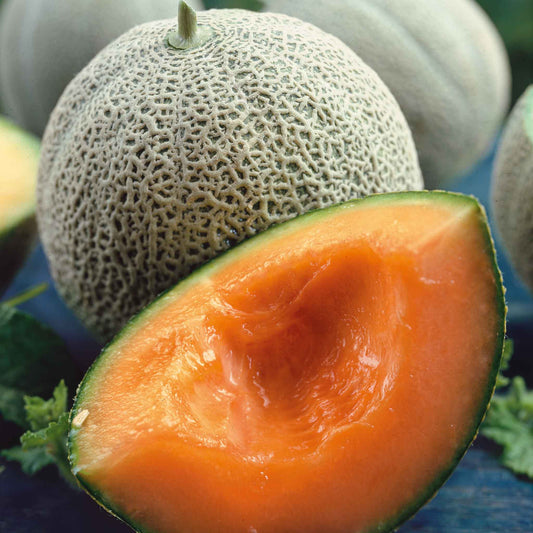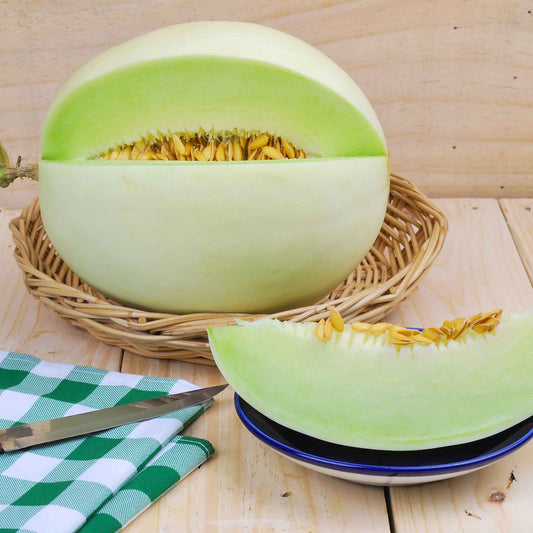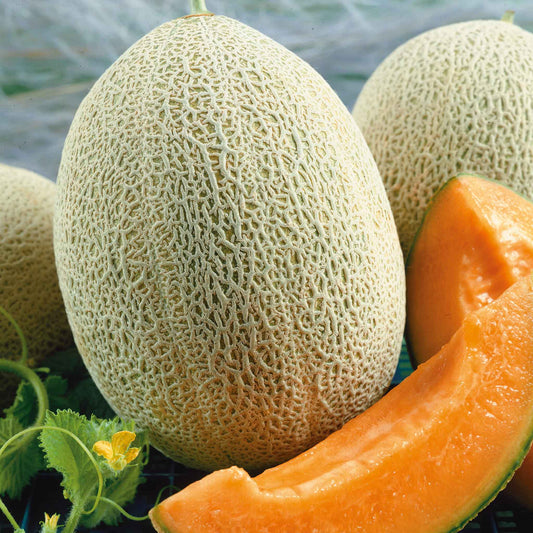-
main-collection-product-grid

Melon Seeds (Organic) - Honey Rock
Delicately sweet orange flesh, high yieldsMelon Seeds (Organic) - Honey Rock
Delicately sweet orange flesh, high yieldsRegular price As Low As $6.99Regular priceUnit price per -
main-collection-product-grid

Melon Seeds (Organic) - Honeydew Green
Sugary and succulent pale green fleshMelon Seeds (Organic) - Honeydew Green
Sugary and succulent pale green fleshRegular price As Low As $6.99Regular priceUnit price per -
main-collection-product-grid

Melon Seeds (Organic) - Hales Best Jumbo
Early to mature, standard large muskmelonMelon Seeds (Organic) - Hales Best Jumbo
Early to mature, standard large muskmelonRegular price As Low As $6.99Regular priceUnit price per
The wonders of growing organic cantaloupe
- Thrives in bright, sunny growing areas
- Also known as Muskmelon
- Offers a sweet, juicy, and tender flavor
- Contains high levels of vitamin C and A, and other healthy antioxidants
The best organic cantaloupe is grown at home
Organic cantaloupes are a staple crop in most home summer gardens because they thrive in the heat. Watermelon, honeydew, and cantaloupe are all considered to be quite easy to cultivate and are grown similarly. Expect a melon dining experience like no other if you cultivate heirlooms like Eden Brothers' Edisto 47 Melon Seeds, Honey Rock Melon Seeds, or Hale's Best Jumbo Melon Seeds.
Store-bought, bland cantaloupes and honeydew melons are more like far, distant relatives on that side of the family than "cousins" to the homegrown type. Cultivating and enjoying an organic melon from your own garden is so fulfilling and delicious that the first time you eat one, you'll be hooked on growing them for yourself.
How to grow your own organic cantaloupe
Direct sowing in the garden should take place two to four weeks after the last spring frost. Start organic cantaloupe seeds two to six weeks before transplanting if establishing them indoors. Choose a sunny location with loose, moisture-retaining, well-drained soil. Plant seeds in four-inch peat pots approximately 1/2 inch deep with a soil temperature of 75°F in a south-facing window or with bottom heat if starting inside. Harden off your organic cantaloupe seedlings before transferring them outside, or spread six seeds per six to eight inch high, flat-topped mound in the garden. Sow seeds one inch deep in mounds three to five feet apart, loosening the soil to 12 inches and working in two to three inches of compost. If you have a small garden, consider using a trellis. Keep in mind that roots can stretch from ten inches to several feet into the ground, requiring a great deal of room.
How to care for organic cantaloupe plants and fruits
As the vines lengthen, apply several inches of organic mulch. Give the plants plenty of water, especially after they've been transplanted and as the fruits grow. Organic cantaloupes need one to two inches of water every week, and they like to be watered first thing in the morning. It's best not to get the leaves damp. As the cantaloupes get closer to maturity, cut back on the watering. When melons are ripe, they naturally separate from the vine, allowing you to harvest them with just a little tug. To bring out more natural tastes, keep your organic cantaloupes at room temperature for two to three days after harvesting. After that, put them in the fridge.
For more information about planting, growing, and caring for organic cantaloupe seed, see the Cantaloupe Seeds Planting Guide.


